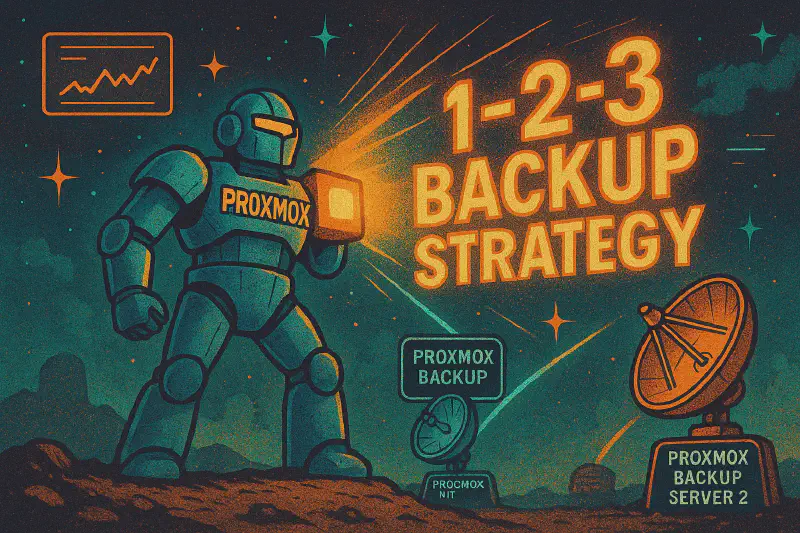Security-First Proxmox Backup Strategy:
Multi-Site,
Ransomware-Resistant,
Auditable
Protecting your data isn’t just about redundancy—it’s about outsmarting modern threats like ransomware and ensuring you’re always one step ahead.
In my personal homelab environment, I wanted backup practices that rival those found in enterprise datacenters—robust, auditable, and truly resistant to attack. Here’s how my two-site Proxmox backup setup tackles these challenges with layered security, strict access controls, and robust backup retention.
Design Highlights
1. Localized & Isolated Backups
- Each Proxmox host/cluster sends backups only to its on-site PBS.
- Hosts cannot access, view, or interact with the remote PBS at the other site.
2. Minimal Privilege Access
- Proxmox hosts have add- and read-permissions on their PBS: they can store new backups, but never modify or delete them.
- Every PBS login used for backups is tightly scoped; hosts only see what’s strictly necessary.
3. Namespace Segmentation
- Bochum PBS can only sync to its
bochumnamespace on Dülmen PBS, and vice versa. - This enforced separation contains any potential breach to a single namespace, not your entire backup environment.
4. Secure Administration
- 2FA (Two-Factor Authentication) is mandatory on all admin accounts for both PBS instances.
- Every administrative action is protected by strong, unique credentials and 2FA. No single compromised password can risk the whole backup system.
5. Long-Term Backup Retention
- PBS is configured to keep a backup history spanning several months. I always have safe restore points, even if an attack goes unnoticed for weeks.
- Retention handling is done solely by each PBS server.
- No Proxmox host has the permission or interface to delete any backups from the PBS.
- PBS-to-PBS sync is set up so that it never deletes data during replication—backups are only ever added, never pruned by a sync job.
- This means even if a host or account is compromised, attackers can’t delete any backup data from the backup servers.
6. Tamper-Proof Logging and Auditing
- All admin actions and backup jobs are logged, supporting transparent oversight and forensic readiness in case of suspicious activity.
Ransomware & Attack Resilience
- Immutable Backups: Write-only and namespace-isolated backups mean ransomware infecting a production host cannot encrypt or erase existing backup archives.
- Multi-Factor Barriers: 2FA for admin accounts stops unauthorized changes, even if credentials leak.
- Multi-Month History: If an infection or data corruption goes unnoticed for some time, you still have a wide window of clean restores.
- Geographical Redundancy: Backups are stored offsite, meaning even a full-site breach or hardware failure leaves your recovery options intact.
- Cannot Delete Backups via Hosts or Sync: Only PBS handles retention, and only according to predefined policies—no user or sync job can delete backups externally.
Conclusion
This approach turns your Proxmox backup system into a fortress:
- Rigorous compartmentalization
- Least-privilege user accounts
- Strong authentication
- Tamper-resistant, long-term backup retention
- Backups can never be deleted from outside the PBS
If ransomware comes knocking—or even if site-wide disaster strikes, you’ll have resilient, trustworthy backups ready, and your path to recovery will be swift and secure.
